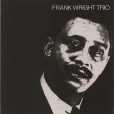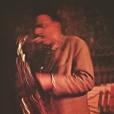Your basket is empty

His 1966 debut (with Henry Grimes on bass), after ESP founder Bernard Stollman saw him play as John Coltrane’s guest at the Village Vanguard.
Clifford Allen commented in All About Jazz: ‘Wright was one of the forerunners of the multiphonics-driven school of saxophonists to follow the direction pointed by Ayler, but with a more pronounced bar-walking influence than most of his contemporaries. Whereas Ayler’s high-pitched wails, wide vibrato and guttural honks all belied an R&B pedigree, his solos still contained the breakneck tempos and facility of bebop… Wright, on the other hand, offers his honks and squawks with a phraseology derived from the slower, earthier funk of R&B and gospel music… The opening The Earth starts with a brief vibrato-heavy and bluesy slow theme on unaccompanied tenor that quickly erupts into a frantic screamer of a solo, a mix of buzzing upper-register cries and low bleating honks, occasional recognizable stock R&B phrases making their way into the melange… Unlike Ayler, there is not a significant amount of solo construction, for it appears Wright was throwing together ideas in a spirit of jubilation.’
His second ESP, one year after the Trio date, offering ‘passionate explorations of four of his originals, plus Jones’ The Lady. Rather intense at times, these emotional performances still sound groundbreaking three decades later. One of Frank Wright’s finest recordings’ (AllMusic).
Intriguing quartet, with Jacques Coursil and FW’s Cleveland homie Arthur Jones — two BYG mainstays in the making — and bassist Steve Tintweiss and Muhammad Ali both on fire.


